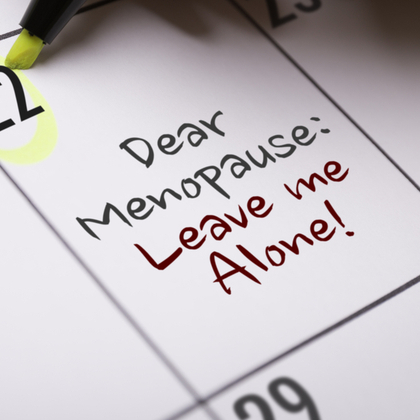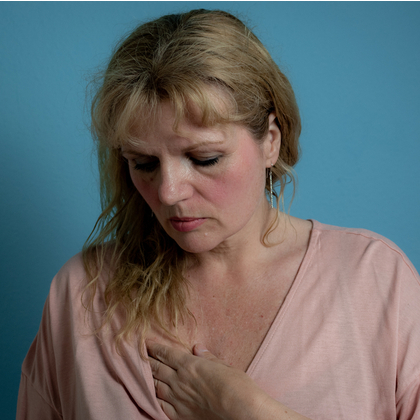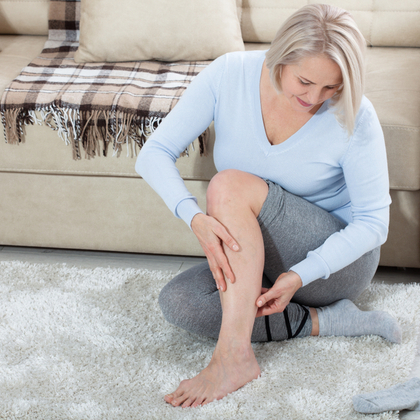
When you think of the classic menopausal symptoms, your mind might turn to hot flushes and mood changes. But for some women, the menopausal transition may also be characterised by lesser-known symptoms, including new or worsening allergies and asthma.
What’s the link between menopause and allergies?
Despite anecdotal cases, there’s still limited scientific evidence on the link between menopause and allergies. However, preliminary research suggests that hormonal changes in menopause, as well as puberty, menstruation, and pregnancy, may exacerbate or lead to allergy symptoms in some women (1).
Since there are oestrogen receptors all over the body, including on most immune cells, researchers believe that the fluctuating oestrogen levels in menopause may impact how immune cells respond to allergens (2).
Fluctuations in oestrogen may also trigger an inflammatory response in the airways, which may explain why menopausal and post-menopausal women are more likely to experience respiratory issues like asthma (3).
It’s also worth mentioning that allergies can flare up at any point in a woman’s life besides menopause. Moving to an area with more allergens, increased pollen counts due to climate change, and natural worsening of allergies over time could also be behind new or aggravated symptoms.
What allergies are associated with menopause?
Some women may develop a new sensitivity to pollen – causing sneezing, itchy eyes, and fatigue – certain foods, or something else completely during menopause. Others may notice that pre-existing conditions, like asthma, change or get worse.
What can trigger menopause allergies?
Aside from fluctuating oestrogen, smoking, caffeine, and alcohol may also trigger or worsen allergies in menopause. Cutting back – or cutting out entirely – can help manage symptoms.
What is histamine intolerance?
Unlike a reaction to a specific allergen, histamine intolerance (also known as HIT) is caused by the inability to metabolise histamine, resulting in an excessive accumulation of histamine (4).
Histamine intolerance happens when the body struggles to remove histamine build-up, leading to a range of symptoms – many of which are similar to those of an allergic reaction and even menopause. They include flushing, palpitations, rashes, hives, itching, tiredness and sleep issues (5).
Can menopause cause a histamine intolerance?
Menopause alone doesn’t trigger histamine intolerance; certain foods, medication, and stress levels may also play a role (6).
However, histamine levels appear to spike when oestrogen is high, which means menopause can be challenging for some women as it's often characterised by raised and erratic oestrogen levels, which may lead to histamine build-up and symptoms of histamine intolerance (7).
Natural treatments for menopausal allergies
Allergies are typically an over-response of the immune system, so re-educating and supporting it naturally is one of the best approaches to reduce symptoms.
Try a low histamine diet
If you suspect a histamine intolerance might be your behind unpleasant symptoms, you may wish to experiment with a low-histamine diet. Broadly speaking, this means eating more fresh, unprocessed foods – which are lower in histamine – and avoiding fermented foods, like cured meats, cheese, yoghurt, and alcohol – which are higher in histamine (8).
Acupuncture
There’s some evidence to suggest the ancient Chinese medicine practice of acupuncture may help stimulate the immune system and support the reduction of allergy symptoms (9).
Mediterranean-style diet
A plant-focused Mediterranean-style diet – rich in whole grains, vegetables, fruits, beans, and nuts – is packed with nutrients that support the immune system, reduce inflammation, and lower respiratory allergies, including asthma (10).
Key nutrients
Making simple tweaks to your nutritional intake is a great way to strengthen the immune system and buffer against allergies.
Vitamin C
Found in citrus fruits, strawberries, tomatoes, and cruciferous vegetables, vitamin C supports the normal function of the immune system. A 2018 study revealed vitamin C may help reduce oxidative stress, which appears to play a key role in allergic conditions (11).
Quercetin
Quercetin is the most widely researched bioflavonoid. Evidence suggests it may inhibit the release of histamine and other allergic and inflammatory substances (12). Apples, berries, grapes, tea, herbs, and even wine are rich sources of quercetin.
Vitamin D3
Synthesised by direct sun exposure and found in oily fish, egg yolks, and mushrooms, vitamin D3 is vital for immune function. Studies report low levels may worsen or trigger allergies (13).
NAC
N-Acetyl-Cysteine (NAC) is the stable form of cysteine, one of twenty amino acids involved in building proteins throughout the body. NAC is often recommended to support respiratory health, so may be useful for asthmatics (14). Cysteine is found in most high-protein foods, including turkey, chicken, cheese, and yoghurt.
Zinc
Abundant in whole grains, dairy, seafood, and meat, zinc is another critical nutrient for immune function. Zinc deficiencies are often seen in patients with allergic rhinitis (hay fever) and asthma (15).
Magnesium
Magnesium contributes to normal muscle function, including those of the bronchial tubes, which may provide some allergy relief. Almonds, cashews, dark chocolate, and brown rice are great sources of magnesium.
Vitamin E
Vitamin E supports the protection of cells from oxidative stress, making it an important addition for immune health. You can find vitamin E in peanuts, spinach, pumpkin, and avocado.
Omega 3
Found naturally in oily fish and plant-based microalgae, the long-chain omega-3 fatty acids, docosahexaenoic acid (DHA) and eicosapentaenoic acid (EPA) are believed to have anti-inflammatory properties, which may offer some protection against inflammatory conditions, including allergies and asthma (16).
Live cultures
80% of your immune system resides in the gut; if your gut isn’t healthy, your immune system won’t be, either. Taking high-strength live cultures – comprised of good bacteria that help the gut work optimally – can support both gut health and immune health, and provide a buffer against allergy symptoms.
Sleep
Sleep is the elixir of life – and it’s vital for allergy and asthma management. Without enough sleep, you compromise the immune system, which, as studies suggest, may lead to more uncontrolled asthma episodes or allergic conditions (17).
Aim for 7-9 hours of quality sleep every night. You can learn more about the best ways to support your sleep hygiene here.
Move more
Exercise also plays an important role in strengthening the immune system, preventing it from kicking into overdrive when allergens are around.
In one study, researchers found a 10-day winter exercise program reduced allergic airway inflammation in participants with asthma and allergic rhinitis (18).
Try to move your body a little and often. Finding something you enjoy will help, too – be it running, walking, swimming, or tennis.
Other practical changes
-
Wear wraparound sunglasses outdoors
-
Shower and remove clothes after being outside
-
Avoid the early morning and evening when the pollen count is at its highest
-
Clean and hoover your living environment regularly
-
Use hypoallergenic detergent and household products
-
Consider using an air purifier in the house
-
Sleep with the windows shut at night when pollen counts are high and air quality is poor
How to manage menopausal allergies
Alongside lifestyle changes and holistic interventions, conventional treatments may also help manage symptoms in the short term.
Nasal rinses
Nasal rinses with saline solution reduce the build-up of mucus and allergens, which can improve breathing and minimise symptoms.
OTC (over the counter) medications
OTC antihistamines lower the body's histamine production. Histamines are chemicals produced by the immune system that trigger an allergic response.
Prescription allergy medications
In some cases, OTC remedies may not provide enough relief, so your GP may prescribe stronger antihistamines or nasal corticosteroids.
Immunotherapy
Immunotherapy – sublingual tablets or injections – can ‘reset’ the immune response and support those with severe allergies.
HRT and menopause allergies
There’s not currently enough evidence on the relationship between HRT and allergy management in menopause specifically. But since every woman is different, you may find it helpful for your symptoms. As always, it’s advisable to speak to your GP to assess whether it’s the best treatment option.
Find out more
If you found this piece useful, you can find similar guidance on our dedicated Menopause Health Hub. Alternatively, please get in touch with our team of expert Nutrition Advisors, who are on hand to provide free, confidential advice
References:
-
Macsali F et al., Respiratory health in women: From menarche to menopause. Expert Review of Respiratory Medicine 2012; 6(2): 187–202.
-
Bonds RS, Midoro-Horiuti T. Estrogen effects in allergy and asthma. Curr Opin Allergy Clin Immunol. 2013; 13(1):92-9.
-
Bonds. Estrogen effects in allergy, 92-9.
-
Maintz L, Novak N. Histamine and histamine intolerance. Am J Clin Nutr 2007; 85(5):1185-1196.
-
Histamine Intolerance. (n.d.). Symptoms. Histamine Intolerance Symptoms of Histamine Intolerance. [online] Available at: https://www.histamineintolerance.org.uk/about/symptoms/
-
Comas-Basté O, Sánchez-Pérez S, Veciana-Nogués MT, Latorre-Moratalla M, Vidal-Carou MDC. Histamine Intolerance: The Current State of the Art. Biomolecules 2020; 10(8):1181.
-
Bódis J, Tinneberg HR, Schwarz H, Papenfuss F, Török A, Hanf V. The effect of histamine on progesterone and estradiol secretion of human granulosa cells in serum-free culture. Gynecol Endocrinol 1993; 7(4):235-9.
-
Comas-Basté. Histamine Intolerance, 1181.
-
Witt CM, Brinkhaus B. Efficacy, effectiveness and cost-effectiveness of acupuncture for allergic rhinitis - An overview about previous and ongoing studies. Auton Neurosci 2010; 157(1-2):42-5.
-
Koumpagioti D, Boutopoulou B, Douros K. The Mediterranean diet and Asthma. The Mediterranean Diet 2020; 327–336.
-
Vollbracht C, et al.. Intravenous vitamin C in the treatment of allergies: An interim subgroup analysis of a long-term observational study. Journal of International Medical Research 2018; 46(9):3640–3655.
-
Mlcek J, Jurikova T, Skrovankova S, Sochor J. Quercetin and Its Anti-Allergic Immune Response. Molecules 2016; 21(5):623.
-
Mirzakhani H, Al-Garawi A, Weiss ST, Litonjua AA. Vitamin D and the development of allergic disease: how important is it?. Clin Exp Allergy 2015; 45(1):114-25.
-
Lee PH, Hong J, Jang AS. N-acetylcysteine decreases airway inflammation and responsiveness in asthma by modulating claudin 18 expression. Korean J Intern Med 2020; 35(5):1229-1237.
-
Djuric V, Djarmati D, Djordjevic-Denic G, Tomic-Spiric Vesna, Peric-Popadic A, Sojic J, Raskovic S, Bogic M. Zinc and copper in serum and induced sputum of patients with allergic rhinitis and allergic asthma. Allerg
-
M; M.J.. Role of omega-3 fatty acids and their metabolites in asthma and allergic diseases. Allergology international: official journal of the Japanese Society of Allergology 2015.
-
Xi Y, Deng YQ, Chen SM, Kong YG, Xu Y, Li F, Jiao WE, Lu G, Tao ZZ. Allergy-related outcomes and sleep-related disorders in adults: a cross-sectional study based on NHANES 2005-2006. Allergy Asthma Clin Immunol 2022; 18(1):27.
-
Prossegger J, Huber D, Grafetstätter C, Pichler C, Braunschmid H, Weisböck-Erdheim R, Hartl A. Winter Exercise Reduces Allergic Airway Inflammation: A Randomized Controlled Study. Int J Environ Res Public Health 2019; 16(11):2040.
Disclaimer: The information presented by Nature's Best is for informational purposes only. It is based on scientific studies (human, animal, or in vitro), clinical experience, or traditional usage as cited in each article. The results reported may not necessarily occur in all individuals. Self-treatment is not recommended for life-threatening conditions that require medical treatment under a doctor's care. For many of the conditions discussed, treatment with prescription or over the counter medication is also available. Consult your doctor, practitioner, and/or pharmacist for any health problem and before using any supplements or before making any changes in prescribed medications.
Related Posts

Olivia
Olivia Salter has always been an avid health nut. After graduating from the University of Bristol, she began working for a nutritional consultancy where she discovered her passion for all things wellness-related. There, she executed much of the company’s content marketing strategy and found her niche in health writing, publishing articles in Women’s Health, Mind Body Green, Thrive and Psychologies.
View More



